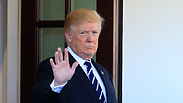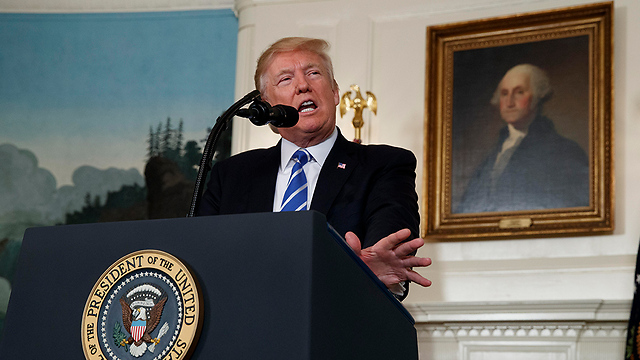
US President Donald Trump
צילום: AP
Jerusalem declaration: Once again, Trump favors words over action
Op-ed: Instead of providing the ‘historic deal’ between Israel and the Palestinians, as he promised to do, the US president has apparently given up the hard and challenging work involved in diplomatic negotiations for the sake of empty statements.
In 1995, Republican Senator Bob Dole decided to run for president of the United States. It wouldn’t hurt, he thought to himself, to get some Jewish support. There was a problem, however. The veteran senator from Kansas, who served as Senate majority leader, wasn’t known to be particularly fond of Israel. Quite the opposite.

So what did he do? He recycled a bill that was presented about a decade earlier by one of Israel’s greatest friends, Democratic Senator Daniel Patrick, and resubmitted it under his name. And that’s how—after countless discussions, debates and threats—the Jerusalem Embassy Act, calling for the relocation of the American embassy from Tel Aviv to Jerusalem, was born.
On Wednesday, US President Donald Trump is expected—like Presidents Bill Clinton, George W. Bush and Barack Obama before him—to sign a waiver delaying the implementation of the Jerusalem Embassy Act and postponing the embassy’s relocation due to “national security interests.” Instead, he is expected to declare that the US recognizes Jerusalem as Israel’s capital. But signing the waiver is a reminder of something the president likely isn’t aware of, and which many Congress members would rather forget: That the embassy relocation law wasn’t actually supposed to be executed.

Trump. The attempt to execute the Jerusalem Embassy Act or change Jerusalem’s diplomatic status quo could end in a disaster (צילום: AP)
In light of the Clinton administration’s firm objection and threats to veto the law, an unusual compromise was born: Congress would pass the law, but would include a provision under which the president may suspend the law’s implementation according to his own discretion. In other words, Congress passed the law assuming it would never see the light of day. That way, everyone stood to gain: The lawmakers raked in voters and donations for supporting Israel; and the administration, on the one hand, didn’t prevent pro-Israel legislation, and the other hand, alleviated Arab states’ fears by indicating that it had no intention of allowing its implementation.
In a perfect reflection of a political theater, the Jerusalem Embassy Act was a symbolic, empty and superficial move, which wasn’t actually aimed at changing reality on the ground. And that is essentially what President Trump is likely about to do: Instead of providing the “historic deal” between Israel and the Palestinians, as he promised to do, he has apparently given up the hard and challenging work involved in diplomatic negotiations for the sake of empty declarations. And instead of using the momentum he gained following his successful visit to the Middle East and advancing a creative and bold solution to the conflict, Trump is once against settling for words at the expense of action.
We must not forget there is a good reason why the Jerusalem Embassy Act, which was enacted 22 years ago, was never implemented: Because it harms the US, and it harms Israel too indirectly. Trump’s predecessors—and quite a few Israeli leaders—objected to the embassy’s relocation because they understood the cost would be greater than the benefit: Not only would the US give up its status as a decent mediator in the conflict, which would only hurt Israel, but the president would waste the little sympathy he had left in Arab capitals, inflame the Arab street and divert the attention from the real regional threat—Iran’s growing power.
So before opening champagne bottles and celebrating the declaration, it’s important to remember that the Jerusalem Embassy Act was born by mistake. The attempt to execute it or change Jerusalem’s diplomatic status quo could end in a disaster.
Dr. Yoav Fromer teaches politics and history at Tel Aviv University.










